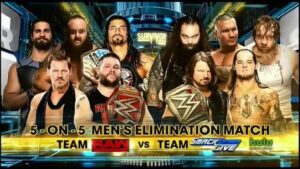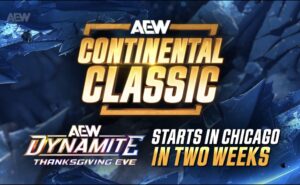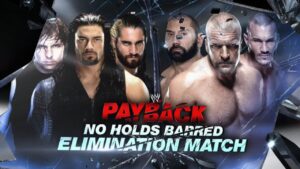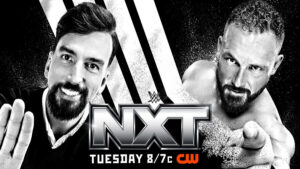In honor of Black History Month, we here at Last Word on Pro Wrestling will be conducting a series of articles on pioneers in the world of professional wrestling involving African-Americans (or in some cases, African-Canadian or African-British). In this installment of our series, we look at international megastar Bobo Brazil, who transcended racial barriers and become a main event draw from the 1950s through the 1980s.
As we’ve seen in past profiles, there were many African-American wrestlers who paved the road for others to follow in the sport, but the first African-American to capture the national wrestling zeitgeist with a Superstar aura was Benton Harbour, Michigan’s Bobo Brazil. With his menacing size (he stood 6’6″ and weighed 270 lbs.) and unsuspecting athleticism, Brazil was a fan favorite for 36 years.

The man who started out as Houston Harris got his pro sports start playing professional baseball. As a player with the Black House of David team in the Negro Leagues, Harris thought he had his career set. But a chance encounter with pro wrestler Joe Savoldi changed all that. Savoldi, a former college star with Notre Dame and with the Chicago Bears in the NFL, had become a pro wrestler following his playing days. Impressed with Harris’ size and athletic ability, he talked him into pursuing professional wrestling instead. Following his initial training, he went to Canada, starting out with Maple Leaf Wrestling in Toronto in 1951 and working around Ontario and Michigan. Initially, he was known as BuBu Brasil “The South American Giant”, but most promoters misspelled his name on posters and flyers as Bobo Brazil, and ultimately the erroneous spelling stuck.
It wasn’t long before Brazil made his way deeper into the US territories of the National Wrestling Alliance (NWA). While his early years in the US more often saw him matched against other African-American wrestlers, the fans clamored to see Brazil match up against more of the top white stars. It was a move to the West Coast that would see Bobo Brazil finally reach his true potential. It began in the NWA Los Angeles territory, where he began a championship tag team alongside Wilbur Snyder, capturing the NWA International Television Tag Team titles twice in his first year in 1954. He would also return to his home area in Detroit, working Michigan and Ohio, where he won his first singles title, the NWA Eastern Heavyweight Championship with NWA Midwest out of Cleveland in 1956. It was during this time that he first encountered a man who would become one of his fiercest rivals, the original Sheik in Detroit.
By the end of the 1950s, he would debut in Japan, touring regularly with Rikidozan‘s Japan Pro Wrestling Alliance (JWA), facing Rikidozan pupils such as Giant Baba and Antonio Inoki, as well as Rikidozan himself. Bobo Brazil’s charisma and personality transcended ethnic and racial barriers, and he was on his way to international superstardom.
In 1958, he won his first titles in Canada, winning Maple Leaf Wrestling’s NWA Canadian Open Tag Team titles with former NWA World Champion “Whipper” Billy Watson, and in Detroit, he captured the NWA Detroit United States Heavyweight Championship in 1961. In the early 60s, he would also begin working in the US Northeast territories, particularly Vince McMahon Sr.’s World Wide Wrestling Federation (WWWF). During the racially charged 1960s, Bobo Brazil would become one of the WWWF’s most decorated champions, winning the company’s secondary title, the WWWF United States Championship (it preceded the WWF Intercontinental Championship by 15 years) a record seven times, including two lengthy title reigns – his third reign lasted 1,335 days between 1963 and 1967, and his seventh reign lasted from 1971 to 1976, a whopping 1,837 days.
In 1962, Bobo Brazil would almost make history as the first ever NWA World’s Heavyweight Champion. During a house show Newark, New Jersey, on August 18, Brazil pinned NWA World Champion “Nature Boy” Buddy Rogers. But when Rogers claimed to be injured after the match, Brazil refused to take the title, opting to wait to beat Rogers when he was healthy. While the local promoter’s doctors declared Rogers fit the next day and that his injury had been a ruse, while the local promotion declared Brazil the new NWA World Champion, the NWA itself did not, and to this day does not recognize the title change. It wouldn’t be until four years later that Brazil would finally win his first World Championship, and it would be in his safety zone on the West Coast.
When NWA Los Angeles seceded from the NWA in 1961, it rebranded as its own stand-alone entity, World Wrestling Alliance (WWA). Now separated from the NWA, the WWA created its own World Heavyweight Championship, held by the likes of former NWA World Champion Eduoard Carpentier, Rikidozan, Freddie Blassie, Dick The Bruiser and Lou Thesz. It was in 1966 – three years after Bearcat Wright became the first African-American World Champion capturing the same title – that Bobo Brazil defeated “Killer” Buddy Austin for his first World Championship. He would defeat Austin for the title again in 1968 for his second World title, holding it for 341 days until it was abandoned at the end of the year when the WWA returned to the NWA umbrella (as NWA Hollywood), forcing them to relinquish their own World title.
Brazil would continue to be a traveling phenomenon within the NWA umbrella, working territories around the country. His rivalry with The Sheik was legendary, and he would end up a 7x NWA Detroit US Heavyweight Champion and would continue to wrestle for NWA Hollywood, becoming a 4x NWA Americas Heavyweight Champion with them. In the late 1970s, he became a mentor to an up and coming African-Canadian wrestler named “Soulman” Rocky Johnson, and during his late runs with the WWWF, he was managed by James Dudley, a WWWF arena manager who did just about every task within the company. Dudley became infamous for waving around a white towel to rile up the crowds as Brazil made his entrance.
Bobo Brazil wrestled his final match in 1993, retiring after a 42-year career in the industry as one of the greatest African-American ambassadors of the sport and an inspiration to countless generations of new wrestlers, of any race, color or creed. He was inducted into the WWE Hall of Fame in its second class, in 1994, becoming the WWE’s first African-American wrestler inducted (his manager James Dudley was also inducted that year).
Check out more of our articles on The Pioneers of pro wrestling.
Stay tuned to the Last Word on Pro Wrestling for more on this and other stories from around the world of wrestling, as they develop. You can always count on LWOPW to be on top of the major news in the wrestling world, as well as to provide you with analysis, previews, videos, interviews, and editorials on the wrestling world.






